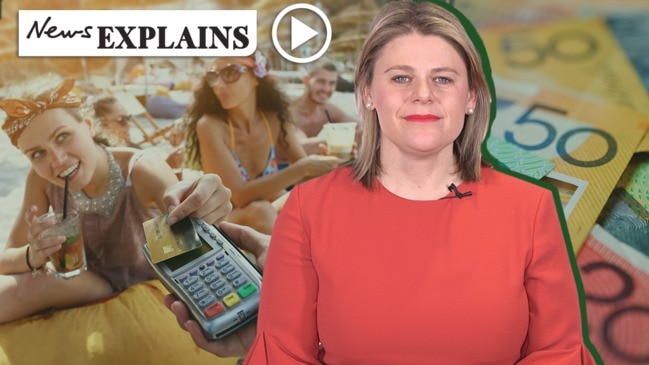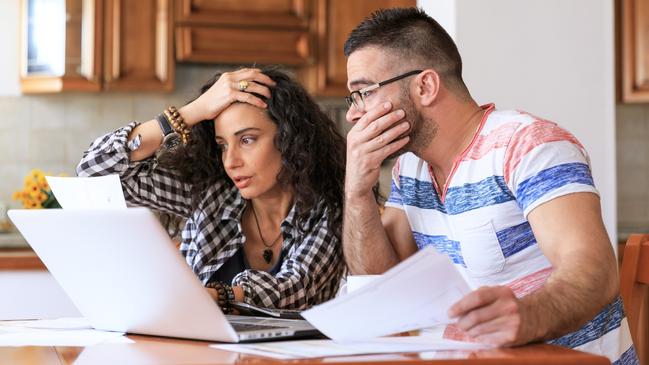How financial advice can be a lifesaver
Australia may be the second wealthiest country on earth but we also have some of the highest rates of household debts in the world. If you really want to get a handle on your money, you need to focus, writes the Barefoot Investor.

Barefoot Investor
Don't miss out on the headlines from Barefoot Investor. Followed categories will be added to My News.
It all began on a Date Night last year, when Liz said to me: “You’ve sold over a million copies of your book … what’s next?”
“Well, I’ve been thinking a lot about that”, I said. “And I think I’d like to go to … TAFE.”
Liz stared at me blankly.
“I’d like to study for a diploma of (non-profit) financial counselling”, I continued.
“So”, she replied warily, “this will be a correspondence course you’ll do at night ... after the kids are in bed, right?”
“Well … not exactly. I’m thinking I’ll head back to class … just like my old uni days.”
At this point, Liz began chewing her food very slowly, and raised her eyebrows.
“But you’re a married man with a full-time business and three children under the age of six!” she protested.
“Precisely!” I said.
So this year I’ve been one of those super-annoying mature-age students.
It’s been a lot of fun … I’ve sent selfies to my staff as I enjoyed a lazy beer on the lawn on a Thursday arvo while they worked (losers!) … but I’ve also learnt a hell of a lot.
I have the finance part covered, obviously.
Yet learning the art of counselling people who are, in many cases, suffering severe stress and trauma — they may have fled a family violence situation, lost their home, or fallen gravely ill — is both challenging and rewarding.
Helping people who can never repay you is a real honour.
And now, a year on, I can happily say that I made it through my lectures (both in class and when I arrived home late … where my new-found counselling skills have come in handy).
There’s just one thing left for me to do before I graduate.
The course has a practical component that I’m still completing: I’m required to spend 220 hours volunteering in the trenches … more on that next week.
Tread Your Own Path!

Q&As
HELP ME, I’M WITH 28 BANKS
BRAD WRITES: I am with 28 different banks (including credit unions).
Some charge monthly, some are purely online. I was wondering what you would recommend as a single bank — who I’m probably with already — to consolidate it all together.
I am also with MyBudget, who are helping me with my unpaid bills.
I am 35 years old and earn $82,000. What should I do?
BAREFOOT REPLIES: You seriously have 28 different banks?! What do you use for a wallet — a suitcase? People see you down the street: “There’s Brad at the ATM again, rifling through his suitcase of debit cards ... trying to remember which one has the money on it.”
Then again, some people collect stamps, or tattoos, or husbands, so whatever floats your boat.
Now you can have 28 banks if you really want … but one MyBudget is way too many.
MyBudget is just awful.
If you’re broke and can’t pay your bills, you sure as hell can’t afford to spend thousands of dollars a year on a glorified budgeting app.
(I wonder if MyBudget suggests that its expensive ongoing fees are the most important bills that need to be paid?!)
Now, after years of promiscuous banking, you want my advice on being a banking bachelor?
Well, you should give your rose to whichever bank you want. After all, all authorised deposit-taking institutions (ADIs) are covered by the government’s deposit guarantee up to $250,000, and none pay any interest worth crowing about these days.
Yet if you really want to get a handle on your money, you need to focus: after you’ve chosen your one and only, set up different savings and spending buckets, and begin banking on yourself.
TAXING QUESTION FROM A WOOLIES WORKER
TIM WRITES: I am one of the thousands of people Woolworths has underpaid over the past decade, and I am now waiting for them to pay it back.
The first payment will supposedly be made before Christmas. I do not know at this stage how much I will get, but it could be quite a bit.
My question is: what can I do so that I do not pay a HUGE amount of it in tax? I have moved on from the job and just do not want the government taking everything.
Could I get Woolworths to pay the tax perhaps?
BAREFOOT REPLIES: I highly doubt that Woolies is going to pay your tax.
However, I spoke to the ATO this week about it. They say you’ll be entitled to a tax offset to ensure you don’t pay more tax than you would have if you’d been paid correctly at the time.
And how is that worked out? All you need to do is include the lump sum payment (including any amounts of tax withheld from them) in your tax return and the ATO will calculate the amount of any offset. And what about your super contributions?
Woolies will also have to pay you additional super, which may cause you to go over your contributions cap.
If that happens, the ATO will either disregard the excess or allocate it to another year.
Basically, the ATO understands you’ve been sold some broken eggs, and they’ll try to unyolk them for you.

HELP, WE ‘BOUGHT’ A $3000 HOUSE
JARROD WRITES: My wife and I are some of the many victims of first homebuyer advertising.
You know the ads — “If you have $3000, you can buy a home!” And as a young couple we did not fully understand the effect of getting a loan to get a loan.
We bought our home in 2014, at the top of the Perth market. Five years on and our house is valued at $70,000 less than what we owe.
I have a well-paying long-term job ($200,000+) and my wife stays at home and looks after our four wonderful children, but we are depressed. What options are available to resolve this?
BAREFOOT REPLIES: For those of you playing along at home, you may wonder how Jarrod could buy a home for $3000.
The answer lies in his statement, “we did not fully understand the effect of getting a loan to get a loan”.
The $3000 claim is just advertising spin to get potential postcode povvos through the door.
Then they’re hit with the reality stick: You still need to come up with the deposit, so the developer’s finance arm will often arrange a high-interest unsecured personal loan to cover the deposit, on top of the mortgage (which is also much more expensive than what most people pay, because you have no history of savings plus an expensive personal loan to repay!).
But it gets worse. These cheap starter homes are built in cheap starter suburbs, and they’re generally the first to drop in value when there’s a downturn.
And that effectively locks buyers in: they can’t get the capital growth to refinance, and so they’re forced to continue struggling to pay off their expensive loan.
It’s a vicious circle.
Three grand to be in the doghouse!
So, given it’s a stinky sandwich, what would I do in your situation?
Well, if you’re content to stay in the home long-term, it doesn’t really matter what the value is in the short-term.
What matters is clearing your debts.
And in that regard you’re more fortunate than many postcode povvos — you’re earning good dough, so focus on knocking off the personal loan you took out for the deposit. Pronto.

A LIFELINE FOR THOSE IN FINANCIAL STRIFE
MADELINE WRITES: No help needed! I just wanted to thank you.
I work for Lifeline Australia and I talk to countless people who want to end their lives because of the financial trouble they have got themselves in.
I cannot wait to be able to refer your non-profit service to people in their time of crisis.
You will change many more lives, just like you have changed mine.
BAREFOOT REPLIES: Thanks for your kind words. Australia may be the second wealthiest country on earth (behind Switzerland), but we also have some of the highest rates of household debts in the world.
Financial stress tears families apart and causes a lot of misery.
Lifeline plays an important role in helping these vulnerable people. Thank you for the work you do.
Lifeline: 131 114
If you have a burning money question, go to barefootinvestor.com and #askbarefoot
The Barefoot Investor for Families: The Only Kids’ Money Guide You’ll Ever Need (HarperCollins)RRP $29.99
The Barefoot Investor holds an Australian Financial Services Licence (302081). This is general advice only. It should not replace individual, independent, personal financial advice
